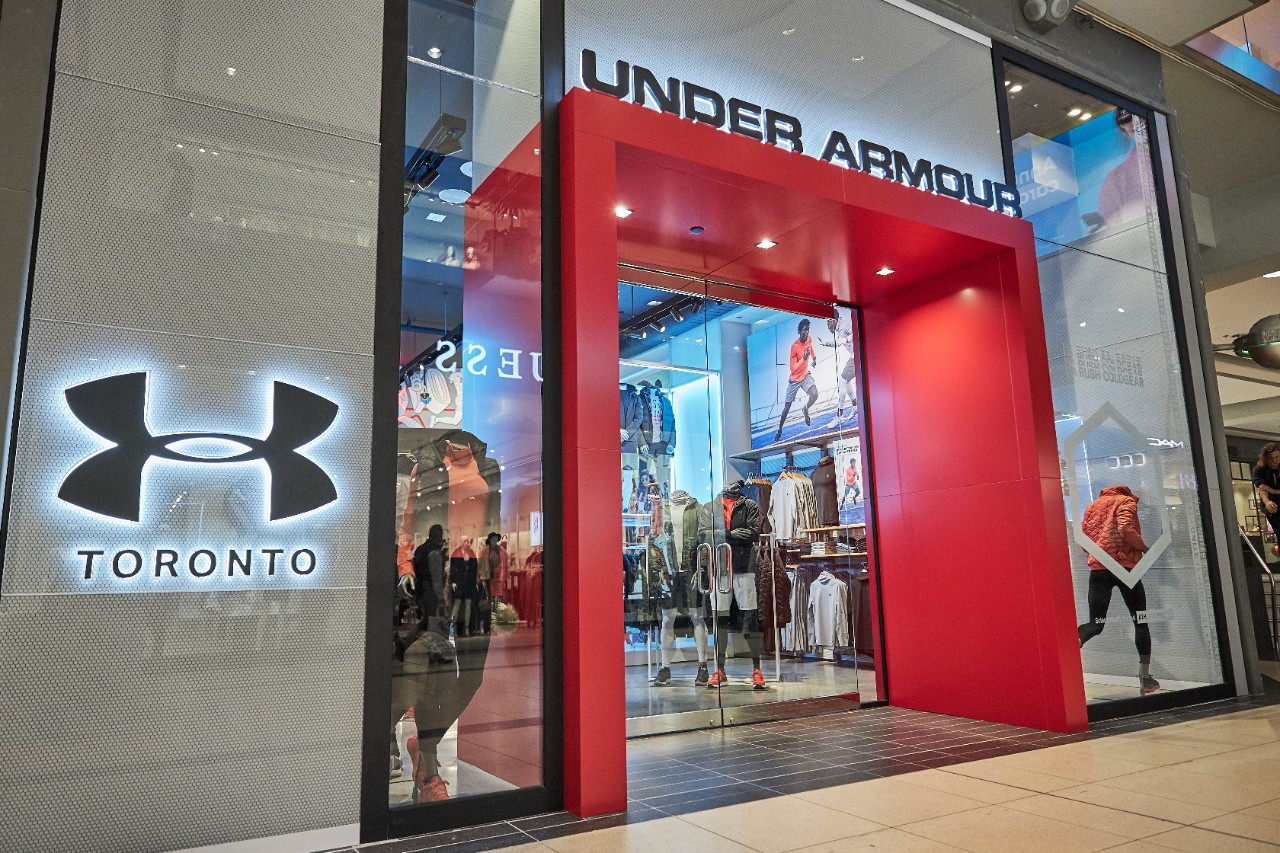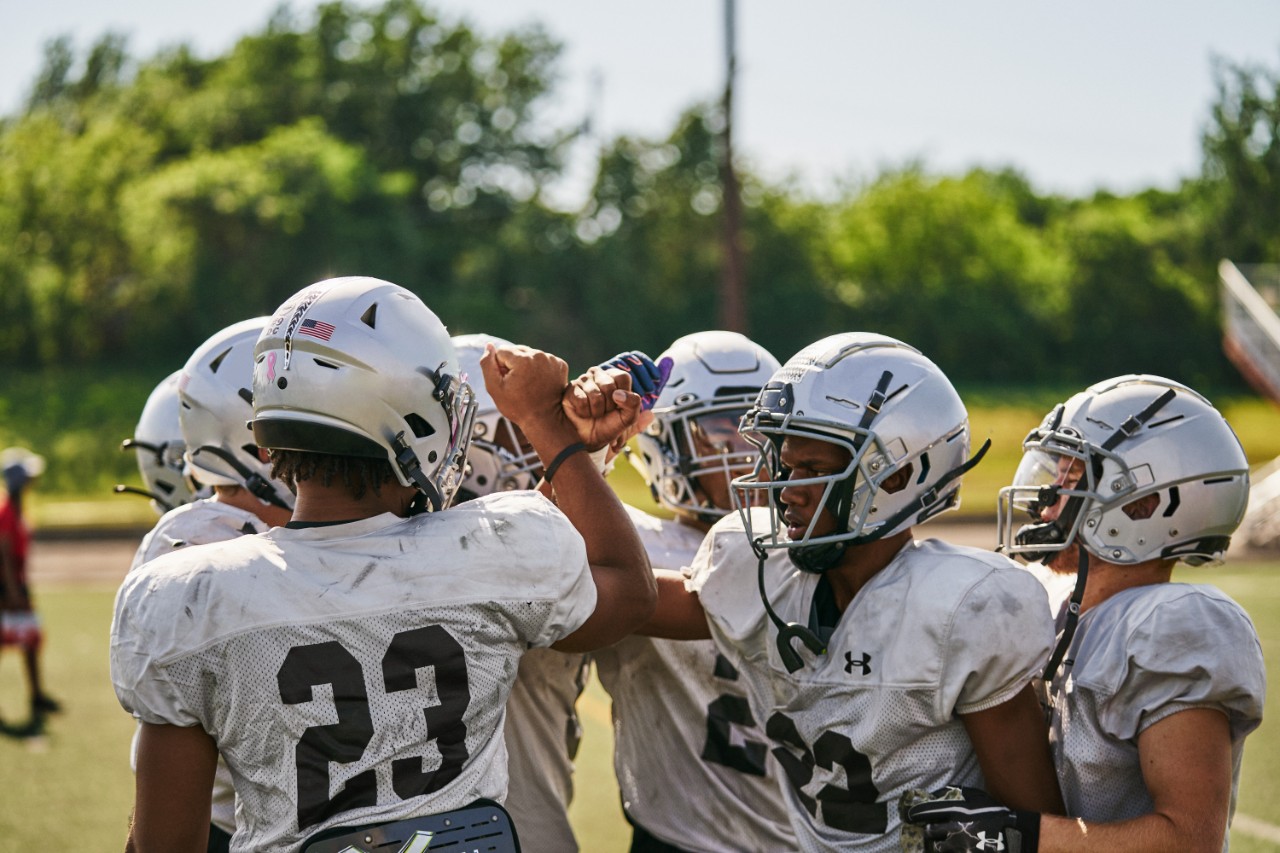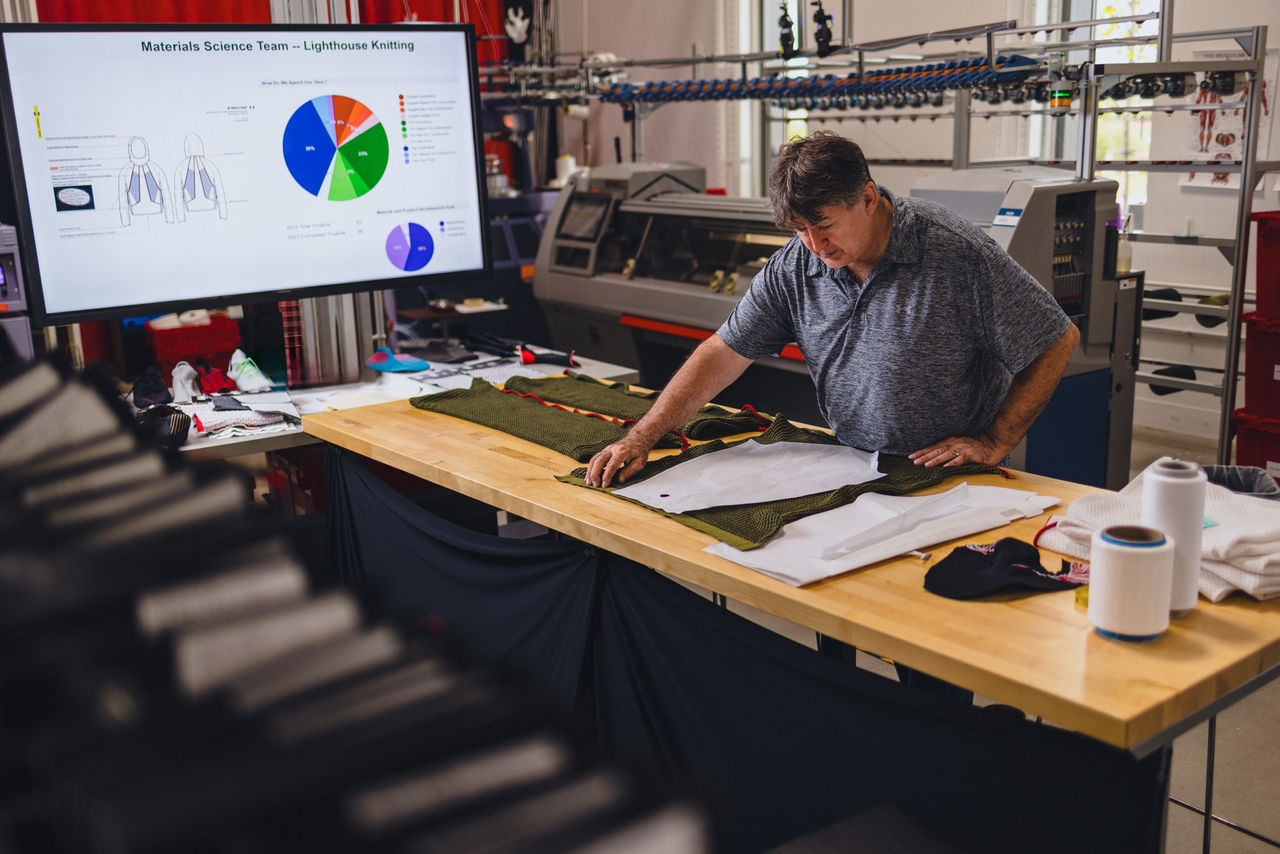GRI Standards: 403-1, 403-2, 403-3, 403-4, 403-5, 403-6, 403-7, 403-8
Our teammates and suppliers’ workers bring different backgrounds, experiences and perspectives to their work, and they are central to driving long-term success.
At UA, we are committed to elevating the teammate experience.
Investing in Teammate Development
Our purpose—empowering those who strive for more—is embodied in our commitment to helping our teammates develop their skills, grow their careers and achieve their goals. We believe our investment in these areas enhances our teammates’ engagement, improves the efficiency and productivity of our work, and ultimately drives better results for our business.
We prioritize and invest in a wide range of training and development opportunities for teammates at all levels, including online and instructor-led internal and external programs. All our teammates are encouraged to utilize their access to Armour U, an online learning platform and knowledge database that offers an extensive, regularly updated library of seminars on a variety of topics. We also offer resources to support individual development planning and incorporate development opportunities into teammates’ annual goal-setting processes.
Building Leadership Strength
Through our succession planning efforts, we focus on talent development for key roles, ensuring we have the talent required to execute our long-term plans. We also invest in developing the leadership capabilities of people leaders at all levels, including through trainings on effectively managing, communicating with and driving team performance. In addition, we offer three core training sessions for leaders:
Our UA Leadership Academy equips new leaders with functional skills and knowledge.
Our Talent Accelerator Program accelerates the growth of emerging leaders with high potential to be a successor for key roles.
Our Leading at UA program provides opportunities for senior leaders at the director level or above to practice their strategic and leadership skills.
Providing Competitive Total Rewards
Our total rewards strategy provides market competitive and internally equitable rewards designed to allow us to attract, engage and retain a talented, diverse and inclusive workforce. We focus on offering competitive, market-based pay and packages that account for job responsibilities and geographic locations.
Fair and Equitable Compensation
We are committed to achieving pay equity within all teammate populations. With the assistance of third-party experts, we conduct an annual review of pay equity and market comparison data. When we identify opportunities, we take prompt action to close any gaps.
Creating a Safe Work Environment
Everywhere we operate—in our distribution houses, retail stores and corporate offices—protecting our teammates and ensuring their safety comes first. In our retail stores, teammates receive safety training upon onboarding, and pre-shift huddles include safety tips. At our distribution houses, shifts routinely start with safety huddles to provide teammates with relevant tips and advice on avoiding potential hazards.
If an injury does occur, we conduct a root-cause analysis to assess contributing factors and implement practices and policies to prevent similar incidents in the future. We use a centralized incident reporting system and leverage other data, such as hours worked, to closely monitor near misses, injuries and various safety metrics. Since 2018, our key safety metrics have shown meaningful improvement, while also continuing to beat industry averages compiled by the U.S. Bureau of Labor Statistics (where available), reflecting our strong safety practices and outcomes.
Every month, we share information on health and safety trends from the previous 30 days with distribution house leaders. This information includes updates on safety audits and other proactive measures—such as opportunities to correct improper lifting—as well as reactive indicators after an incident. We compare these indicators with trends over the previous year to drive ongoing improvement. Our distribution house leaders’ quarterly business reviews include discussion of security measures and safety metrics.
We also offer various safety initiatives focusing on teammate safety within and outside of the workplace.
Partnering with Our Suppliers
We are committed to respecting the rights of those who create, make, wear, use, promote and connect to our products, as noted in our Global Human Rights Commitment. As a purpose-led, values-based organization, respect for human rights is part of our foundational commitment to responsible business practices. We follow the United Nations Guiding Principles on Business and Human Rights (UNGP), taking responsibility for respecting human rights in our operations, our supply chain and the communities where we operate.
A world-class supply chain can only be achieved when every participant commits to respecting human rights, including treating our suppliers’ workers with dignity and respect and providing safe workplaces and dormitory conditions. We are committed to ensuring all parties in our supply chain are working toward this common goal. Our supply chain social compliance program is accredited by the Fair Labor Association (FLA), which reflects a level of rigor in our policies and practices, goal-setting and -monitoring efforts, as well as our progress in remediating problems to improve conditions for our suppliers’ workers in our global supply chain.
Key Milestones in Our Supply Chain Journey
Increasing transparency and due dilligence
- 2006
- 2014
- 2018
- 2019
- 2020
- 2021
- 2022
- 2023
Key Milestones in 2006
- Joined the FLA as a Category B Licensee.

Key Milestones in 2014
- Adopted the FLA Sustainable Compliance Initiative methodology.
- Joined the FLA as a participating company and developed our supplier diagnostic and assessment tool according to Under Armour and FLA Codes of Conduct and benchmarks.

Key Milestones in 2018
- Formalized the Under Armour Responsible Sourcing Policy.
- Joined a multi-stakeholder Freedom of Association pilot program.
- Incorporated focused migrant worker labor assessments conducted by third parties into our sustainability program due diligence process.
- Joined the Better Buying Institute.
- Signed the American Apparel & Footwear Association (AAFA)/FLA Apparel & Footwear Industry Commitment to Responsible Recruitment.

Key Milestones in 2019
- Received social compliance program accreditation by the FLA’s Board of Directors.
- Joined the Mekong Club.

Key Milestones in 2020
- Engaged Impactt Ltd, a business and human rights consultancy, to enhance our existing supplier assessment tool with a strengthened focus on the International Labour Organization’s (ILO) Indicators of Forced Labor and conducted training on modern slavery due diligence.
- Launched expanded training on our Supplier Code of Conduct, which was mandatory for all corporate and distribution house teammates.
- Launched Supplier Worker Voice Pilot in China, Indonesia, Jordan, Philippines and Vietnam.
- Launched WeCare Pilot in China to support suppliers’ workers and their families.
- Endorsed the ILO’s Call to Action—COVID-19: Action in the Global Garment Industry, participating in its Working Group and International Financial Institution Task Force.

Key Milestones in 2021
- Diversified our supplier audit methodologies to incorporate assessments and verifications through the Social & Labor Convergence Program (SLCP)/the Higg Facility Social Labor Module (FSLM) self-assessments and, in China, Better Work assessments, in addition to the existing Under Armour Sustainable Assessment Tool and Report.
- Published the Under Armour, Inc., Global Human Rights Commitment.
- Published the Under Armour Migrant Worker Policy and Standards.
- Became an ILO Better Work Buyer Partner.

Key Milestones in 2022
- Became member of The Centre's Child Rights in Business (CRIB) Working Group.
- Expanded Worker Voice Program to Cambodia, Colombia, El Salvador, Malaysia and Turkey and developed the Grievance Escalation Protocol.
- Expanded WeCare+ program to Vietnam and expanded program scope to enhance maternity protection and gender equality in our supply chain.

Key Milestones in 2023
- Participated in Reimagining Industry to Support Equality (RISE) through partnership with a Bangladeshi factory to support equality for women in our supply chain.


Our Responsible Sourcing Policy supports our commitment, as an FLA-accredited company, to the FLA’s Principles of Fair Labor and Responsible Sourcing. Our policy, which was last revised in 2020, encompasses the scope and complexities of our supply chain, financial and contractual terms, balanced planning, accountability, training, communication and review.
Responsible Sourcing Training for Teammates
We provide ongoing training programs on responsible sourcing for our global product supply and sustainability teams. For instance, our sustainability team has conducted Responsible Sourcing Policy training for supply chain leaders and teammates in the Asia-Pacific and Latin America regions.
In addition, the sustainability team regularly participates in industry and NGO-led training on a range of topics, including responsible sourcing and purchasing practices, living wages, modern slavery, forced labor, integrating the UN Sustainable Development Goals into supply chains, responsible recruitment and COVID-19’s impact on sourcing practices.
Supplier Responsibility
We require our suppliers to comply with our Supplier Code of Conduct, which details our expectations for respecting the human rights of and protecting the suppliers’ workers in our supply chain, aligns with FLA guidelines, and reflects the core ILO Conventions. It includes provisions on forced labor, compensation, hours of work, freedom of association and collective bargaining, nondiscrimination, harassment or abuse, nonretaliation, reporting potential misconduct and sustainable business practices. Along with the Under Armour Modern Slavery Statement, our Supplier Code of Conduct makes clear we will not tolerate any findings associated with slavery, servitude, forced or compulsory labor, human trafficking or other forms of modern slavery in our supply chain.
We engage third parties to conduct regular audits as part of our efforts to measure and safeguard the well-being, and respect the human rights, of our suppliers’ workers who make our products, while aiming to reduce negative social and environmental impacts from the manufacturing of our products.
Our auditing process begins with our supplier onboarding. If we are sourcing from a new country, our sustainability team conducts a country-level human rights due diligence analysis. Every new Tier 1 supplier must complete our Global Ethics and Compliance Questionnaire and undergo a social compliance audit. The audit evaluates the potential supplier’s practices and workplace conditions against our Supplier Code of Conduct, the FLA Workplace Code of Conduct and Compliance Benchmarks, and applicable laws, as well as other applicable UA policies, standards and commitments they agree to comply with when they sign our manufacturing agreement. Our product licensees and their suppliers also agree to comply with these requirements and their Tier 1 suppliers undergo such audits.
We aim to have all UA onboarded and active Tier 1 suppliers audited annually.
Our Audit Approach
Under Armour Sustainable Assessment Tool and Report (UASATR)
We continue to use the UASATR as a core audit tool to evaluate supplier performance against our Supplier Code of Conduct and compliance with other codes, laws and standards. The UASATR aligns with the FLA’s Sustainable Compliance Initiative methodology, which assesses suppliers’ management systems and working conditions through worker and management interviews, document review, health and safety review, visual inspections and union or worker representative consultations.
Given the increasing concern around risks of forced labor in certain countries, over the past few years we have expanded the UASATR to include additional questions aimed at enhancing the auditors’ ability to assess and report risks of forced labor, modern slavery, debt bondage and human trafficking. These questions include the ILO Forced Labor Indicators and risks potentially applicable to the recruiting, hiring and employment of migrant workers. We also provided additional teammate and auditor training focused on conducting human rights due diligence and identifying forced labor, modern slavery, and human trafficking risks and indicators and human rights and legal compliance issues.
The UASATR measures our suppliers’ performance in 10 social and environmental categories:
Environmental protection
Grievance
Health and safety
Hours of work
Industrial relations
Migratory workers
Recruiting, hiring, and personal development
Terminations
Wages and benefits
Workplace conduct and discipline
Remediation & Collaboration
Our suppliers are valued business partners with whom we aim to maintain long-term relationships. We work closely to support them as they remediate issues. However, if necessary, we may terminate a supplier relationship depending on the specific facts and circumstances, including if a supplier or subcontractor fails to adequately remedy noncompliance up to our satisfaction and standards.
Evolution in Auditing
There are many inefficiencies when suppliers are asked to undergo similar audits by different brands. Because of this, the apparel and footwear industry is shifting toward greater audit alignment which will allow brands to leverage shared auditing tools. As a result, in 2021, we started to incorporate SLCP /FSLM verification and the ILO Better Work assessment into our auditing process. By using common industry assessment frameworks, our suppliers are more willing to share data with other buyers which in turn will enhance our beyond compliance program. For example, in 2022 we completed a total of 168 SLCP verification in lieu of our UASATR assessment.
Effective grievance mechanisms give suppliers’ workers access to remedy under the UNGP. When suppliers’ workers have effective avenues to express their grievances and concerns, their rights are respected, and they are consequently more valued, engaged and productive. In addition, their feedback can foster improvements in the workplace. We are committed to ensuring that our suppliers’ workers have a voice and that suppliers’ workers’ rights to freedom of association and collective bargaining are respected.
Our suppliers are required to maintain systems that enable their workers to effectively and confidentially report their grievances to top management and human resources teams. As part of our supplier auditing process, we evaluate not only whether grievance mechanisms are present, but also whether they are accessible and effective. Our third-party auditors provide factory personnel with their contact information so grievances and information may be shared, and consult with worker representatives, unions and federations, if available, to understand factory conditions when possible.
Additional Grievance Mechanisms
While we require our suppliers to maintain their own worker grievance systems, our suppliers’ workers—and employees of their subcontractors, if any—can also report suspected violations of our Supplier Code of Conduct to our hotline. The hotline is monitored 24 hours a day, seven days a week. It allows for anonymous reporting, depending on location.
When a concern is reported, we investigate and, where appropriate, act, including requiring suppliers to remedy issues. Our supplier hotline is another channel where we can continually monitor compliance with our Supplier Code of Conduct and help safeguard the people who make our products. These mechanisms are listed in the Reporting Misconduct provision of our Supplier Code of Conduct, which has been translated into over 35 languages. This information is required to be posted prominently in suppliers’ facilities and to be addressed in documented facility training on our Supplier Code of Conduct.
In 2020, we developed a Worker Voice Program in partnership with Ulula and Labor Solutions, organizations that are focused on the rights and well-being of migrant workers in our strategic suppliers’ facilities.
The Worker Voice Program connects factories with third-party hotlines and surveys providers to handle grievances. It also collects anonymous survey data about workplace conditions directly and confidentially from suppliers’ workers. The output from the hotlines and surveys becomes part of the suppliers’ due diligence processes and human resource management systems. We also have visibility into these anonymous grievances through a dashboard that allows us to spot trends at the factory level and further help our suppliers make improvements.
We recognize that fair compensation is a fundamental human right, and we remain steadfast in our commitment to ensure that suppliers take the appropriate actions to progressively realize a fair compensation level for their workers. This commitment is reflected in our Supplier Code of Conduct, our Fair Compensation Commitment Statement and our FLA membership.
We have set a goal to implement a fair compensation strategy across our supply chain by 2025, with pilot initiatives implemented in strategic supplier sites by 2023.
Of course, fair compensation exists within a complex environment of considerations and challenges due to the dynamic roles that national and local governments play in setting wages. We recognize that fair compensation will require progressive action over time, and that this is an effort we cannot undertake alone.
We are enhancing our understanding of these issues through activities including:
Collaboration and stakeholder engagement.
Compensation data collection and analysis.
Supplier feedback.
Informed by a comprehensive assessment of human rights risks across our global operations and supply chain, we published the Under Armour Inc. Global Human Rights Commitment. We work with third parties and engage stakeholders to identify human rights risks relevant to our role as an employer, operator, purchaser, designer, innovator and connector. We prioritize managing our human rights risks by categorizing them into five focus areas—operations, supply chain, digital products, communities and the environment. In parallel, we regularly consult with external stakeholders, including civil society organizations, to determine where and how to continue improving.
Migrant Workers
Our Migrant Worker Policy & Standards comprehensively addresses the additional risks migrant workers face and reflects the continued evolution of our sustainability program to address these risks. We developed the policy to communicate our requirements with respect to our suppliers’ employment of migrant workers. These requirements were designed to ensure that migrant workers’ rights are respected, protected and treated equitably throughout our supply chain and across their employment life cycle.
We also require our suppliers to practice responsible recruitment to ensure migrant workers obtain work free of coercion, deception, fees and debt. In addition, we are developing a self-assessment tool for our suppliers to compare their operations against the standards outlined in our policy and identify any gaps for improvement.
From Our Migrant Worker Policy and Standards
Migrant workers must:
Not pay for their job.
Retain control of their personal identity documents.
Have freedom of movement.
Be informed of the basic terms of their employment before leaving home.
Live in well-maintained housing (if provided, secured, referred to, or arranged for, directly or indirectly, by the supplier).
Have access to the equivalent clean, safe and healthy living and working conditions afforded to local residents, including in the event of natural, manmade or global health crisis.
Enjoy demonstrably effective and anonymous grievance systems, without retribution and with demonstrated responsive actions by their employers.
Have access to remedy for any issues faced.
Be repatriated fairly, rapidly and at the employer’s expense.
Suppliers’ Worker Well-Being
In addition to auditing our suppliers’ workplaces, we aim to tangibly improve the lives of our suppliers’ workers. To that end, we are creating an inclusive well-being program for suppliers’ workers and their children, which we aim to make available to 65% of strategic suppliers by 2025.
As part of this effort, we have partnered with The Centre for Child Rights and Business (The Centre) to pilot and deploy WeCare, which offers programs that suppliers can implement to support their workers and suppliers’ workers’ families.
Program offerings include the creation of a child-friendly space (CFS), a safe on-site environment for suppliers’ workers’ children to learn and play while being close to their parents. WeCare also offers migrant parent training sessions, an on-site family activity day and, for select participants, free smart watches to facilitate communication between parents and their children. In 2022, took action to protect and provide resources for female workers like establishing well-equipped breastfeeding rooms in factories where local laws do not mandate them and offering sexual harassment trainings. We plan to expand WeCare to other strategic suppliers as we work toward our 2025 goal.
Last updated September 2023
Governance
Read More
Metrics & Reports
Read More
Issue & Stakeholder Management
Read More
